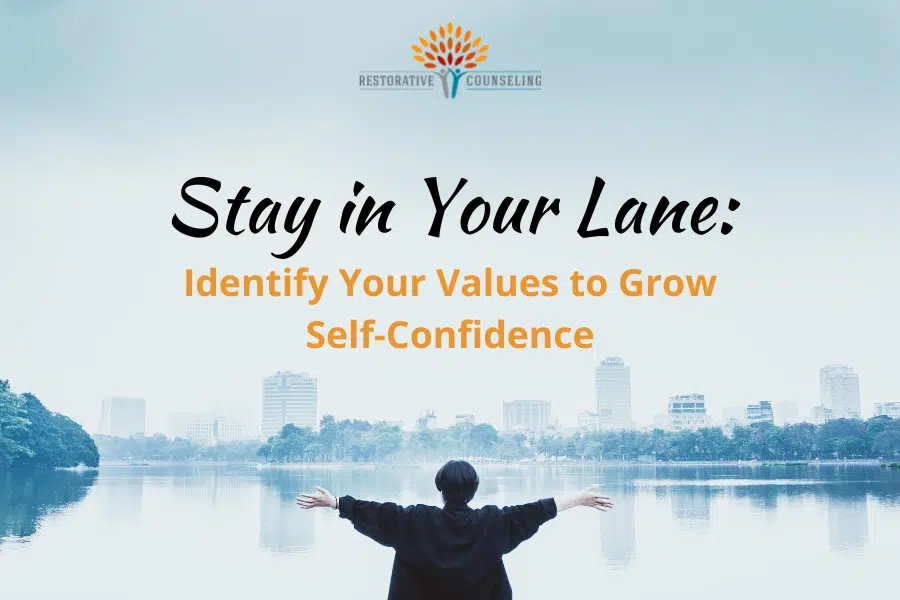Written by Katie Jackson-Griffin, LCPC
Theodore Roosevelt once said, “Comparison is the thief of joy.” He recognized how focusing on what other people are doing can greatly influence our own sense of satisfaction. Comparison places the focus on what is missing rather than on what we do have or what we’re striving for. With social media, there are even more opportunities for comparison. While the intention is to be able to share and connect with others, social media can leave us questioning why we don’t have something or if we should want what others have. This comparison can breed insecurity and greatly damage our self-confidence. It can cause us to question our choices and even cause negative self-talk. When we’re comparing ourselves to others, we might start to believe that we are not as smart, as worthy, or as capable because we don’t have the same things as others.
Consider Avery’s story
Avery was struggling to make decisions with his career, friendships, and romantic relationship. He often felt anxious about how he would be perceived by others. A close friend of Avery’s got a promotion and posted about the accomplishment on social media. Avery found himself feeling envious and angry that he was not moving down that same path. He started to feel afraid and worried that he was not going to be as successful as his friend. While these emotions are natural, he struggled with comparing himself to another. Avery was using his friend’s success as his indicator of success. He had thoughts like, “Should I be doing that too?”, “Am I falling behind?”, “What if I get married too late?”, and “What if I never feel financially independent?” Avery felt himself questioning his decisions and putting himself down.
After many sleepless nights and evenings consumed by comparisons to others on social media, Avery sought help from a therapist. There, his therapist helped him gain insight into how he was feeling lost due to seeing other people’s success as his measure of success. Avery felt stuck in the “societal shoulds” that were telling him what it meant to be successful. His therapist suggested that they work on identifying his values to help him build self-confidence to create his own, unique version of a successful life.
Learn about how to identify your version of success and stop comparing yourself to others.
Identify and apply your values to increase self-confidence and create a fulfilling life.
1. Identify your values
Avery’s therapist suggested that they start with doing an activity called The Value Sort. This activity lists many values and prompts a person to sort them based on their importance. Avery was surprised by how many values he had never considered. His therapist helped him see how he was influenced by society, his family system, and his peers to believe that his career and financial gain “should” be at the top of his list. Instead, Avery concluded that his top three values were actually “family”, “adventure”, and “simplicity.” As a result, Avery realized he wasn’t fulfilled by putting the majority of his energy into his job, like he had been pressuring himself to do so.
Like Avery, the Value Sort activity can be beneficial in helping you to start with a blank slate from which to identify your values. It gives you the chance to learn about various values that you may never have considered. By using tools such as the Value Sort activity, you can focus only on yourself instead of getting lost in comparisons to others when identifying your values. You might surprise yourself with what values you identify as most important in your life.
2. Make decisions in line with your values with confidence
Once you identify your values, you gain a guide for making decisions. Whenever you need to make a choice, you can ask yourself, “Does this decision help me to fulfill my values?”
Staying true to what you want can be difficult. There are many outside influences that can sway you in other directions. It is okay and understandable to feel conflicted at times. Ultimately, you may not “have it all” and may have to make some sacrifices. However, it is important to recognize that there is no right or wrong way to prioritize your values. Each person is unique and has unique needs.
Avery identified that his current job wasn’t allowing him to focus on building a family or seek adventure. He couldn’t take much time off and was given a lot of demanding work, which kept him from spending time with his partner. While he made a high income, Avery realized that money wasn’t the most important thing to him. Instead, he craved simplicity in his life and with his possessions. Despite this insight, Avery struggled to make the choice to seek employment with more flexibility, but less income. He felt the familiar fears creeping in about how he wouldn’t be considered successful. However, Avery knew that he had to follow his instincts and values. He had to make choices based on what was important to him.
3. Stay in your lane
In order to get where you want to go in life, you have to focus on your path only. Getting fixated on what others are doing will only distract you. Their path isn’t relevant to your journey. If you struggle to stay centered on your path, you can work to use grounding statements such as “I am a unique individual. What gives me happiness and peace isn’t always the same as someone else.” You can also acknowledge how a different path could have given you satisfaction, but you can only choose one path. It’s okay to feel sad about making sacrifices. You can’t prioritize everything. With clearly identified values, you can feel more confident in your choices about what to prioritize and what to sacrifice.
Avery was able to take the leap in finding a new job that allowed him more time to spend with his partner. He was able to work fully remote which meant that he could prioritize adventure and travel more. He did feel the pangs of uncertainty with having less income and what society deemed a “less prestigious” job. However, he was able to refer back to what he learned from his Values Sort activity to remind him why he made his choice. Ultimately, Avery found peace in how satisfied he was with his day-to-day and in accomplishing his personal goals. It didn’t matter as much to him what others thought or what they were doing. He felt confident doing what was right for him.
Restorative Counseling can help you identify your values to have more confidence when making life decisions.
Ignoring the noise of others’ experiences and finding our own path can be challenging to do on your own. Restorative Counseling can assist you if you’re struggling with your confidence in how to create a fulfilling life for yourself. We’re here to guide you towards identifying your values and applying them to your life so you can accomplish your goals. To get started, schedule an appointment today!

Hi, I’m Katie!
I use HAES and DBT approaches to help people overcome their challenges with low self-esteem, anxiety, and depression. Read more about me.
Follow Restorative Counseling
Sign up for our newsletter

